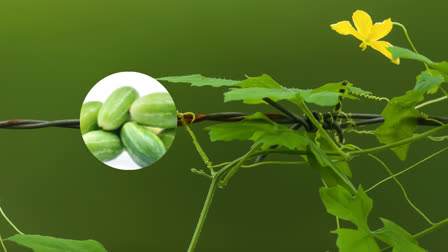Kundru is a panacea for diabetes and obesity, scientists claimed, its leaves and roots also have amazing power…
New Delhi:- Kundru or ivy gourd is an integral part of Indian cuisine. It is known by many regional names like Tendali, Kovakkai, Dondakaya, Tindora, Tonde Kai, Toruni in Gujarat, Goa, Tamil Nadu, West Bengal, Bihar and Karnataka. The unique taste of Kundru dominates any dish. People eat this vegetable in many ways. It can be eaten even without cooking. Its taste is somewhat like cucumber.
This vegetable not only tastes great but it also has many medicinal properties. Let us tell you, Kundru is mentioned in ancient texts since 5000-6000 BC and it is used to treat many diseases and infections. Many ancient Ayurvedic physicians have used this vegetable in many types of treatments including Panchakarma therapy. It was also used to treat intestinal worms, skin diseases and diabetes. This has also been confirmed on the website of pmc.ncbi.nlm.nih.gov.
Kundru is rich in beta-carotene which is very helpful in keeping the heart healthy and preventing heart related diseases. A low-calorie vegetable, kundru has a high water content, and contains a variety of essential nutrients, minerals and vitamins. Rich in iron, calcium, vitamin B1 and B2 and plenty of dietary fiber, Kundru takes care of your overall health. Whether you're trying to control diabetes or lose weight, eating kundru can help all aspects of your health. Some of the many incredible benefits of Kundru are improved metabolism, digestion, prevention of kidney stones, protection from allergies, relieves fatigue.
The root of this vegetable also has great importance. The juice of its roots and leaves is used in the treatment of diabetes. The leaves are used as a poultice in the treatment of skin eruptions, while the plant is used as a laxative. This has been confirmed in a report published on the website of pmc.ncbi.nlm.nih.gov.
Amazing Benefits of Ivy Gourd or Kundru
rich in nutrients
Kundru is a vegetable rich in nutrients. It is an excellent source of vitamins A and C, which are important for maintaining good vision, boosting immunity and promoting skin health. Additionally, it provides a good amount of dietary fiber, which is essential for digestive health.
Helpful in weight management
Kundru can be very helpful for those who want to control their weight. It has low calories, but high water content and fiber, which makes you feel full for a long time. It may reduce overall calorie intake and aid in weight loss or maintenance efforts.
Controls blood sugar level
Kundru has been traditionally used in Ayurvedic medicine for the management of diabetes. It contains bioactive compounds that help in controlling blood sugar levels. Including kundru in the diet can help maintain stable blood sugar levels, making it beneficial for diabetics and people at risk of diabetes.
Promotes heart health
Consumption of Kundru can be very beneficial for heart health. It contains antioxidants like beta-carotene, which helps reduce oxidative stress and inflammation, thus supporting heart health. Apart from this, the fiber present in it helps in reducing cholesterol levels, which is beneficial for heart health.
Enhances digestive health
The fiber present in Kundru helps in keeping the digestive system healthy. It helps prevent constipation and promotes regular bowel movements. High quantity of water also helps in maintaining moisture in the digestive system, which makes the digestion process smooth.
Strengthens immunity
Kundru is rich in Vitamin C, which is an important nutrient for strengthening the immune system. Vitamin C increases the production and function of white blood cells, which are essential to fight infection. Regular consumption of kundru may contribute to a more robust immune response.
Anti-inflammatory properties
Kundru is known for its anti-inflammatory properties. It contains various phytonutrients that can help reduce inflammation in the body. It is especially beneficial for individuals suffering from inflammatory conditions like arthritis.
Post Views: 385


Comments are closed.